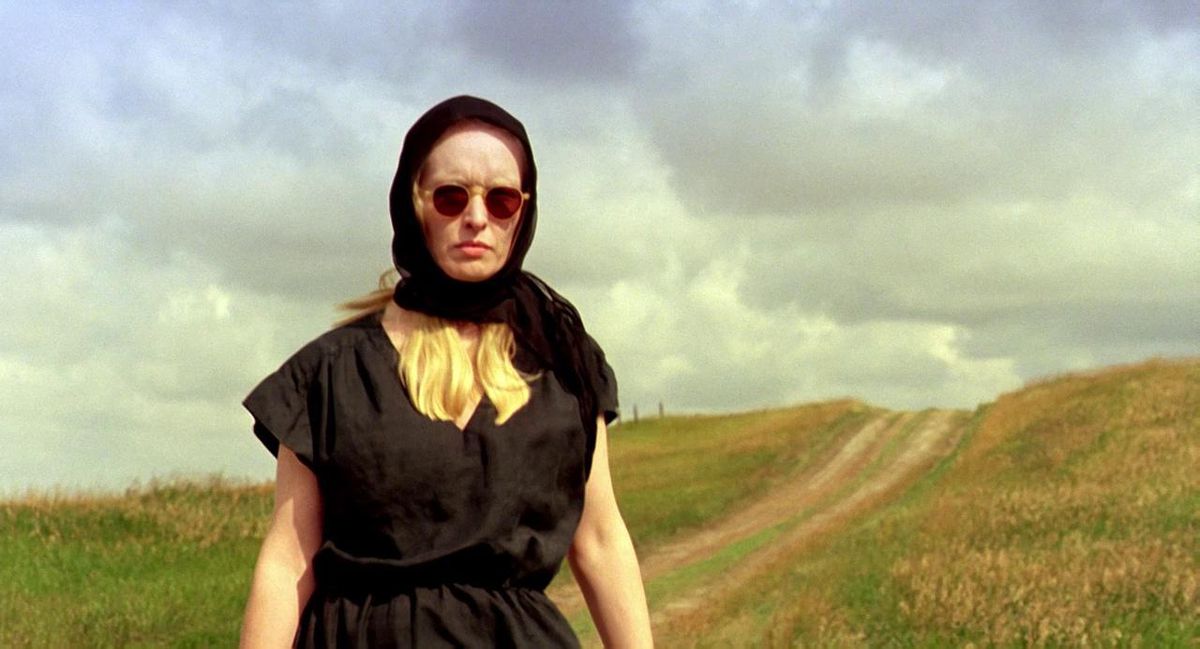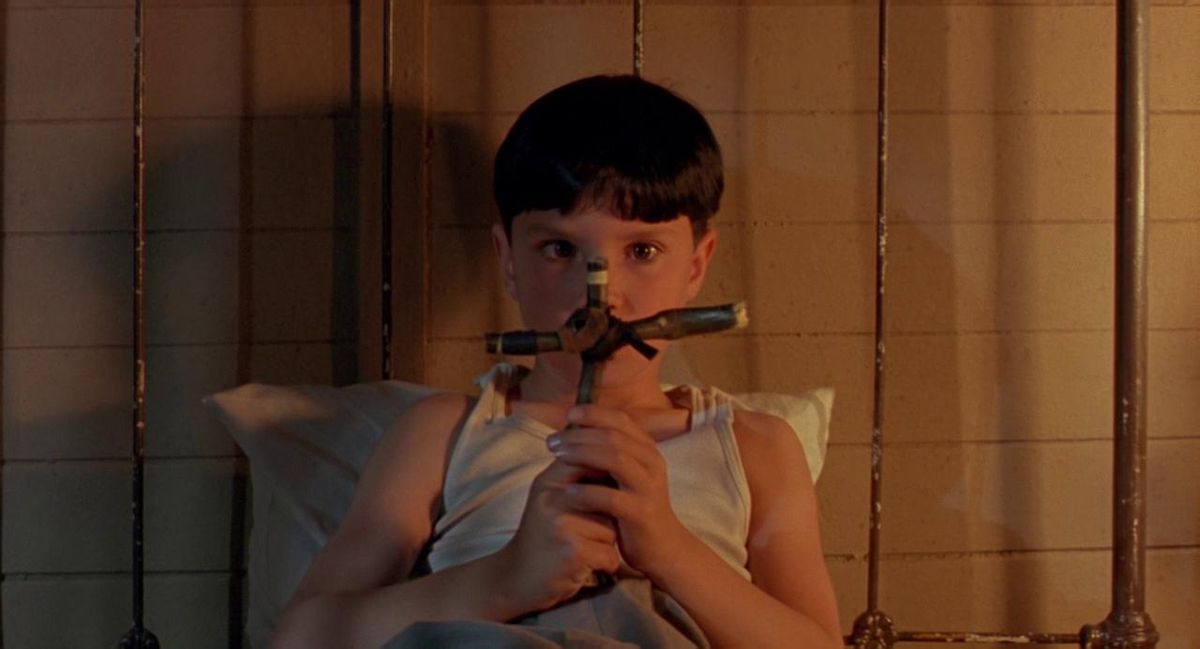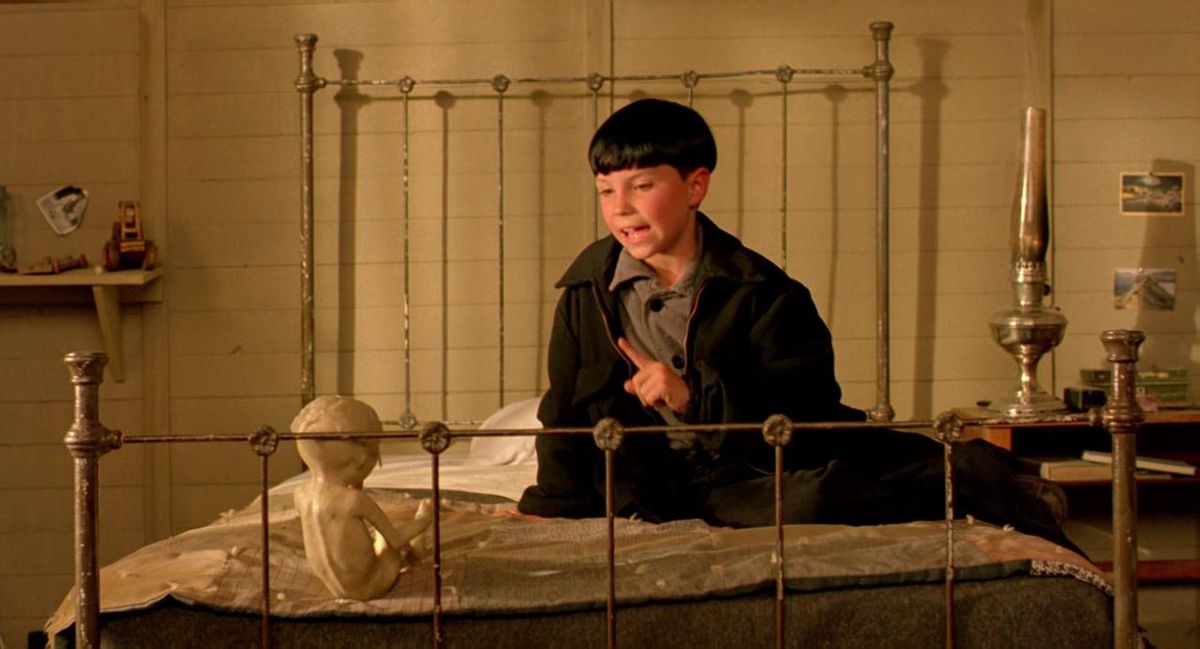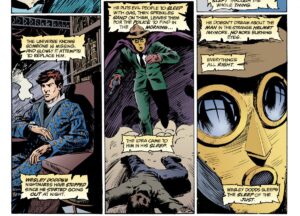There’s a movie, hiding in the recesses of Tubi, Roku Channel, and other ad-supported streaming services, that feels like watching a waking nightmare. It’s an indescribable movie, not really existing in any particular genre. It’s a horror movie, a drama, an arthouse film, and a work of grounded surrealism.
The film is The Reflecting Skin, and it opens with a gorgeous wheat field and a young child carrying an enormous bullfrog. “Look at this wonderful frog!” the boy, Seth, tells his friends. It’s an ominous phrase that will run through the movie, whether calling something wonderful or beautiful. We know that soon after these words are uttered, destruction follows. Surely enough, the frog meets a grisly end that sets the tone for the movie.
And maybe that’s why critics were so divided on it. On its release, it drew its share of detractors — Vincent Canby of the New York Times hated it — and fans, like Roger Ebert, who got in quite the argument with Gene Siskel about it. Ebert compared it to David Lynch, but better, saying “the tone was more carefully controlled.” Siskel said, “To me, the nightmares, I couldn’t relate to any of them particularly.”
But the film has plenty of nightmares to spare. It’s seen from the point of view of Seth, who lives in a remote part of Idaho, far from the nearest town. He has a couple playmates from nearby farms, while his father operates a gas station. The only other neighbor we really see is Dolphin, a woman in mourning over the death of her husband. Seth and his friends become convinced she’s a vampire from how she talks about her grief, suffering in near-silence in a house clad with whaling gear (giving the movie an iconic poster that drew me in when first I saw it somewhere in the recesses of the internet in 2010). She says she’s “200 years old,” conveying the exhaustion and mourning she feels. But Seth, whose father spends most of his time reading pulp magazines, has just heard about vampires in the stories his dad is reading. And now, Dolphin, clad constantly in black, is a vampire who must be stopped.


Seth sees the world as full of monsters. And perhaps he’s right, as a group of creepy young men in a black car patrols the countryside, killing children. From this perspective, it’s a horror movie — especially once Seth’s brother, Cameron, played by Viggo Mortensen, returns from his work helping develop the atomic bomb. Seth’s belief that Dolphin is a vampire isn’t helped by watching his brother’s slow decline from radiation sickness.
But while Seth’s perspective is as if he’s living out a horror film, the adults around him are living out a drama. This is best shown by his brother’s turmoil at his role in the war, or his parents’ fraught relationship and issues with mental illness. There’s also the grief experienced by several characters throughout the movie, which gives The Reflecting Skin a gravity that makes it hard to pin down as just in the realm of horror.
And of course, there’s the flat-out Lynchian touches — omens abound, whether it’s a black Cadillac of predatory young men or lines of dialogue that echo each other right before something very bad happens. These moments inject the movie with surrealistic elements, beyond just centering Seth’s point of view. Even though nothing supernatural happens, it’s an ugly world set against a beautiful backdrop, with Lynchian characters at every turn — definitely, if we’re comparing it, more Blue Velvet than Inland Empire.

It’s easy to see why The Reflecting Skin is divisive. It’s unrelenting in its bleakness. But as a work of art-horror, it’s hard to see how it never got the cult status it deserved, unless you peel back the layers. The film was director Philip Ridley’s debut, and he’d only go on to direct two more movies — 1995’s The Passion of Darkly Noon and 2010’s Heartless, both deeply weird, and the former fairly poorly received (maybe why there was a 15-year gap between projects). Ridley would spend most of his time writing plays, never making much of a name for himself in film.
The Reflecting Skin was released by Miramax, which dropped it on VHS. It would later surface on a few cheap DVDs of horrific quality. A German Blu-ray release didn’t help much either. In fact, it took until a 2019 Blu-ray release from Soda Pictures and Film Movement to get anything that didn’t look degraded on screen. Thankfully, this transfer is the one playing on streaming services, meaning it’s about as good as it will get.
Your own reaction to the film may depend on your tolerance of its nihilism and, frankly, its pretension. The film definitely caters to an arthouse crowd, so people who’ve found themselves turned off by the films of Robert Eggers (The Witch) or Ari Aster (Midsommar) might struggle with it. It doesn’t go as far into self-indulgence as Beau Is Afraid, with three hours of free-association narrative, but it certainly plays up some of its more fatalistic elements to a point that could be seen as excessive. (But both The Reflecting Skin and Beau Is Afraid are in some ways about catastrophic thinking, I suppose.)

But the visuals are remarkable, whether it’s the creep of the Cadillac; the bizarre fetus that Seth talks to, thinking it’s a deceased friend in angel form (another thing that will determine your tolerance for the movie); a stark self-immolation; or the ramshackle farms and barns explored in the movie.
And even if its genre can’t quite be pinned down, the film is effective in its menacing air, drawing us into the marginal lives of the people at the center. If you’re a fan of David Lynch films, you’ll cozy up to it nicely. And if you need something spooky to watch but want something more in line with Hereditary, It Follows, Mother!, or Men — focusing on the craft of filmmaking, intensive narratives, and with elements of postmodernism just as much as honing in on the terror of the horror genre — The Reflecting Skin should fit well into your Halloween season watchlist.
And even if you hate it, you will never forget it.
The Reflecting Skin is streaming on Peacock, Tubi, Pluto TV, Plex, Freevee, and The Roku Channel.
- SEO Powered Content & PR Distribution. Get Amplified Today.
- PlatoData.Network Vertical Generative Ai. Empower Yourself. Access Here.
- PlatoAiStream. Web3 Intelligence. Knowledge Amplified. Access Here.
- PlatoESG. Carbon, CleanTech, Energy, Environment, Solar, Waste Management. Access Here.
- PlatoHealth. Biotech and Clinical Trials Intelligence. Access Here.
- Source: https://www.polygon.com/23915669/reflecting-skin-movie-watch-stream-cult-classic-weird-like-david-lynch
- 2019
- a
- About
- adults
- afraid
- after
- Against
- air
- All
- also
- American
- an
- and
- Angel
- Another
- any
- Anything
- ARE
- around
- as
- At
- back
- backdrop
- bad
- BE
- beautiful
- become
- before
- belief
- BEST
- Better
- between
- beyond
- Black
- bomb
- both
- but
- by
- Cadillac
- calling
- CAN
- car
- carefully
- carrying
- catastrophic
- caters
- Center
- certainly
- channel
- characters
- Cheap
- child
- Children
- Classic
- compared
- comparing
- constantly
- controlled
- convinced
- could
- country
- Couple
- course
- craft
- critics
- cross
- crowd
- David
- death
- debut
- definitely
- determine
- detractors
- develop
- dialogue
- direct
- Director
- divided
- down
- Drama
- Drawing
- dropped
- each
- easy
- echo
- Effective
- either
- elements
- empire
- end
- enormous
- enough
- especially
- even
- Every
- existing
- experienced
- explored
- Face
- fact
- fan
- fans
- far
- Farms
- few
- field
- Film
- filmmaking
- films
- First
- fit
- focusing
- follows
- For
- forgotten
- form
- Former
- found
- Free
- friend
- Friends
- from
- front
- full
- Gaming
- gap
- GAS
- Gear
- GenE
- Genre
- German
- Get
- gives
- Giving
- go
- good
- got
- gravity
- Grounded
- Group
- halloween
- happens
- Hard
- has
- hate
- he
- help
- helped
- helping
- her
- him
- his
- holds
- Horror
- hours
- House
- How
- HTML
- HTTPS
- i
- iconic
- Idaho
- if
- illness
- in
- inject
- Internet
- into
- Is
- issues
- IT
- ITS
- jpg
- just
- know
- later
- layers
- like
- Line
- lines
- lives
- living
- Look
- looks
- magazines
- MAKES
- Making
- May
- maybe
- me
- meaning
- meets
- Men
- might
- moments
- monsters
- more
- most
- movement
- movie
- Movies
- much
- must
- name
- narrative
- narratives
- need
- never
- New
- New York
- New York Times
- not
- nothing
- now
- of
- off
- Old
- on
- once
- One
- only
- opens
- operates
- or
- Other
- out
- over
- own
- part
- particular
- particularly
- passion
- peacock
- peel
- People
- perhaps
- perspective
- plato
- plato data intelligence
- platodata
- platogaming
- played
- Playing
- Playmates
- plays
- Plenty
- plex
- Point
- Point of View
- predatory
- projects
- quality
- quite
- Radiation
- reaction
- Reading
- really
- realm
- received
- reflecting
- relationship
- release
- released
- remarkable
- remote
- returns
- Ridley
- right
- road
- ROBERT
- role
- Run
- Said
- saw
- saying
- says
- Screen
- season
- see
- seen
- sees
- Services
- set
- sets
- several
- Share
- she
- should
- shown
- Skin
- slow
- So
- some
- something
- Soon
- spend
- station
- Status
- Stories
- streaming
- streaming services
- suffering
- supernatural
- Surface
- Talks
- tells
- that
- The
- The New York Times
- the world
- Them
- themselves
- there
- These
- thing
- Thinking
- this
- though
- three
- Through
- Throughout
- time
- times
- to
- tolerance
- tone
- took
- touches
- town
- transfer
- turn
- turned
- tv
- two
- until
- up
- us
- vampire
- very
- View
- vincent
- visuals
- want
- war
- was
- Watch
- watching
- ways
- we
- well
- were
- What
- when
- whether
- while
- WHO
- whose
- why
- will
- with
- woman
- words
- Work
- world
- would
- writing
- years
- york
- you
- young
- your
- zephyrnet












